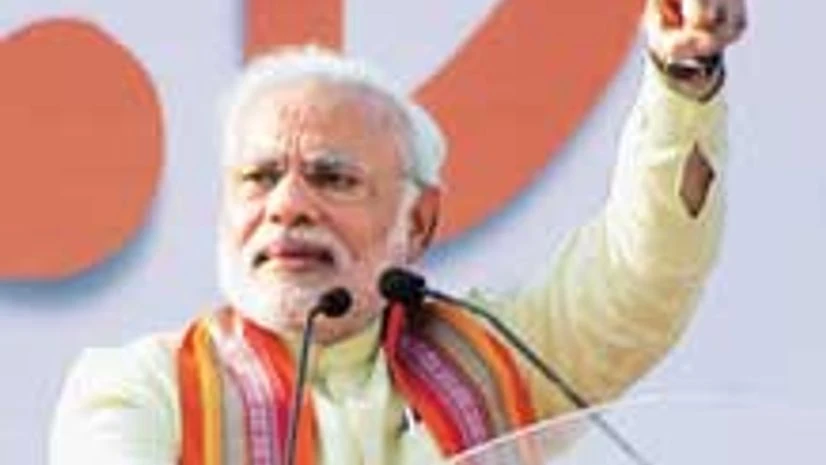The Bharatiya Janata Party's (BJP's) economic agenda, to be unveiled on February 27 by its prime ministerial candidate Narendra Modi, is likely to keep a push for big infrastructure projects and restructuring of welfare schemes high on the list.
In what could be a departure from the United Progressive Alliance (UPA) government's policies of offering sops to various sections of society, BJP's focus could be redesigning of welfare schemes in such a way that these "raise productivity and lead to asset creation". The party's general-secretary, P Muralidhar Rao, tells Business Standard that schemes like the Mahatma Gandhi National Rural Employment Guarantee Scheme (NREGS) need thorough "restructuring" and should be modelled on the Pradhan Mantri Grameen Sadak Yojana.
"Schemes like NREGS should have helped the crisis-ridden agriculture sector. At present, it is not so. Our focus will be on devising ways to ensure money spent on such schemes helps raise production and productivity in the agriculture and allied services," Rao says, adding that specifics of how that could be done were being worked out. "What is important is the vision; details of how to achieve that can definitely be worked out."
More From This Section
At present, a team of experts is working on the party's economic agenda. Party leaders claim the focus is going to be "reviving growth with job creation" and checking inflation. "The years after the launch of economic reforms in 1991 saw periods of low growth and jobless growth. Now, we are staring at a situation where there will be no growth and no jobs. We are working on ways to address this," Rao adds.
The party is looking at a major infrastructure push - both human and physical - to boost growth. Modi has already talked about creating 100 'smart cities'; IITs, IIMs and AIIMS in all states and bullet trains, besides interlinking of rivers, as part of his infrastructure agenda. Major skill development initiatives are also going to be the core of BJP's economic agenda.
Leaders see revival of the manufacturing and agriculture sectors as key to bringing the economy out of the current slowdown. According to them, in manufacturing, attention needs to be given to telecom equipment and indigenisation of the defence sector, among other things.
"Other than oil import, which is unavoidable in the short term, the defence sector adds considerably to our import bills (also responsible for widening of the current account deficit, or CAD). If that is the case, why cannot we go for indigenisation of defence equipment," asks Rao.
BJP's prescription for bridging CAD: Rely more on import substitution than foreign inflow. "The Indian economy can never be converted into a Foreign Direct Investment (FDI) -driven one," Rao argues. He clarifies his party is not opposed to FDI, except in multi-brand retail, but adds that the focus should be on encouraging domestic investment. And, for that to happen, savings rate needs to go up.
For the revival of the agriculture sector, the party is looking at a formula to ensure 50 per cent return on investment for farmers. Other prescriptions include focusing on augmenting irrigation infrastructure - big and small - and stepping up public investment in agriculture research. "Currently, agri-research has become an exclusive domain of big multinational companies. There is a need for greater public investment in developing high-yield varieties of seeds, so that those can be made available to farmers," Rao says.
BJP's economic agenda is likely to also talk about increasing participation of states in the economic decision-making process. The party might also push some major tax reforms. A road map to implement the goods & services tax is also likely to find a place in the party's priority. It might also consider launching alternative savings instruments to keep demand for gold on a leash.
POLICY PARADIGM
Highlights of BJP's likely economic vision
Welfare schemes
- Remodel plans like NREGS on the lines of the Pradhan Mantri Grameen Sadak Yojana
- Shift in focus from distribution of doles to asset creation, production boost and skill development
- Focus on public investment in agriculture infrastructure
- Working on a formula to ensure 50% return on investment for farmers
- Creating smart cities; IITs, IIMs and AIIMS in all states; bullet trains; interlinking of rivers
- Reviving domestic manufacturing
- Focus on telecom and defence equipment
- The Indian economy can never be converted into an FDI-driven one
- But party not against FDI, except in multi-brand retail
- Rely more on import substitution than foreign inflow
- To lower import dependence, go for indigenisation of defence equipment
- GST implementation road map on priority

)
